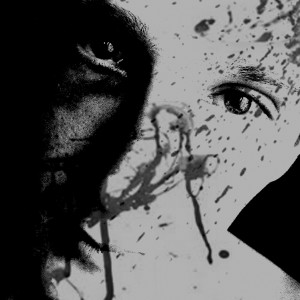Published by Alessandro Violante on February 10, 2016
 The desperate screams, expressed in noise music matter, of a human race that move towards a progressive and unstoppable overturning of values. This is Knots of fear, second Empty Chalice’s release, here under the Gopota monicker, a project made with the russian musician Vitaly, released by his label Torga Amun.
The desperate screams, expressed in noise music matter, of a human race that move towards a progressive and unstoppable overturning of values. This is Knots of fear, second Empty Chalice’s release, here under the Gopota monicker, a project made with the russian musician Vitaly, released by his label Torga Amun.
It’s clear, listening to these nine songs, to recognize the lament of a postmodern man that has lost his identity, that, from the dream of a Ruttman’s great city has reached his personal bad trip in an alienating and terrorizing Trans-Europe Express train, in a trip that apparently hasn’t a final destination. Sometimes, it seems to listen in the background a feeble vital thrust, a (even if far) recall to a quintessential source of inspiration as Kraftwerk’s Metal on metal, submerged by a heavy cacophonic rain that covers and suffocates all.
Nine knots of fear as nine are Dante’s hellish circles in which the human being meanders without a a destination and in which the very heavy steel rhythmics, directly coming from enourmous factories of death, very violently act up with a metronomic rhythm, alienating, suffocating, as well as the constant alternation of emotional tensions and their easings, musically well represented by the alternation of noisy flows, highlights the gasping and desperate breathe of the man that has lost his identity, thas has become a victim of a world dominated by the frustrating perfection of the 0 and of the 1, of the input and of the output. The gaze of the cover artwork character is lost and scared, literally eaten and regurgitated by the machine that he helped to build, by a world glorified and applauded one century ago by Marinetti and the Futurists, but that, later on, has revealed its true nature.
Knots of fear includes songs that reprocess a desperate beat that tries to cheer up a humanity lost under quintals of petroleum and cacophony (Mindless use, a very clear title that express how the human being is called to activate the machine without thinking anything, as this is done by the machine), the already quoted tensions and easings followed by very heavy recursive rhythms (put as if they were parts of a collage), the desperate cry of the human being deprived by his identity in Agony of a pipe dream (a dream destroyed to which several metallic tears follow) and long journeys made through desolate landscapes as in Long road in the dunes and in Nebel, that evokes Fortress’s movie landscapes. There is, in Online periphery, space for a final thought on the loss of human identity within the virtual Web space, apparently a safe shelter in which it’s possible to unleash the frustrations of a human being deprived from his freedom, stained by the strenght of the machine, but that is only a cage characterized by less defined bounds and by a particularly questionable freedom.
A negative album? Yes, definitely, but not as far as his quality is concerned. After all, Gopota aren’t interested in producing a happy album that express a forced positivity, but that, rather, highlights a very strong inner disadvantage. A work that is more influenced from Stalker than from Blade Runner, which scenario isn’t a postindustrial metropolis but the delocalized space of the postmodern alienation, a mental place. Gopota have perfectly succeeded in reaching their goal.
Label: Torga Amun
Score: 7, 5

